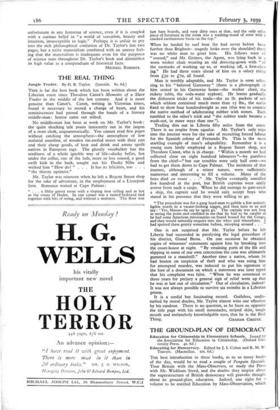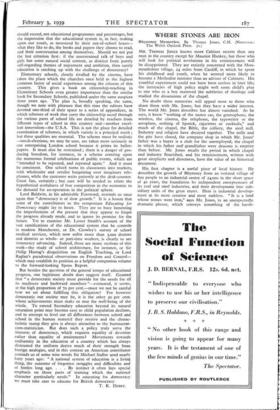THE GROUND-PLAN OF DEMOCRACY
Educating for Democracy. Edited by J. I. Cohen and R. M. W. Travers. (Macmillan. ros. 6d.)
THE best introduction to these books, as to so many books of the day, would be to read a couple of Penguin Specials. Tour Britain with the Mass-Observers, or study the Press with Mr. Wickham Steed, and the doubts they inspire about the superstructure of British democracy will provoke thought about its ground-plan, education. Indeed, one sighs for a volume to be entitled Education by Mass-Observation, which
should record, not educational programmes and percentages, but the impression that the educational system is, in fact, making upon our youth, as measured by their out-of-school hours— what they like to do, the books and papers they choose to read, and their conversation among themselves. Should we not put the last criterion first : if the unrestrained talk of boys and girls has some natural social content, as distinct from purely self-regarding themes of enjoyment and ambition, then surely education is catching up with the challenge of democracy?
Elementary schools, closely rivalled by the cinema, have taken the place which the churches once held as the highest common factor of social experience among the citizens of this country. This gives a book on citizenship-teaching in Elementary Schools even greater importance than the similar book for Secondary Schools, published under the same auspices three years ago. The plan is, broadly speaking, the same, though we note with pleasure that this time the editors have devoted one-third of their space to a series of appendices, in which schemes of work that carry the citizenship motif through the various parts of school life are detailed by teachers from 'Efferent types of school in this country and—another excel- lent innovation—the U.S.A. This is not the place for detailed examination of schemes, in which variety is a principal merit ; but three qualities are essential. The scheme must be realistic —mock-elections, we may be sure, are taken more seriously in one enterprising London school because it prints its ballot- papers. It must also be restrained ; there is a danger of pro- ducing boredom, for instance, in a scheme centring upon the numerous formal celebrations of public events, which are " intended to be repeated, and repeated again." And it must be consistent. One school turns its classrooms into markets, with wholesaler and retailer bargaining over imaginary tele- phones, while the customer waits patiently at the desk-counter. Great fun, certainly ; but care will be needed to relate the hypothetical usefulness of free competition in the economic to the demand for co-operation in the political sphere.
Lord Baldwin, in his admirable Foreword, reminds us once again that " democracy is of slow growth." It is a lesson that some of the contributors to the symposium Educating for Democracy might lay to heart. They are so busy lamenting the imperfections of the present that they appear to forget the progress already made, and to ignore its promise for the future. Yet to examine Mr. Lester Smith's account of the vast ramifications of the educational system that he controls in modern Manchester, or Dr. Crowley's survey of school medical services, which now enlist more than 3,000 doctors and dentists as whole- or part-time workers, is dearly to see democracy advancing. Indeed, there are many sections of this work—the study of school architecture, for instance, or Sir Philip Hartog's disquisition on English Teaching, or Lord Raglan's paradoxical observations on Freedom and Control— which may establish its position as a helpful companion volume to the forward-looking Spens Report.
But besides the question of the general tempo of educational progress, one legitimate doubt does suggest itself. Granted that " a democratic society must provide for the needs for all its mediocre and backward members "—estimated, it seems, at the high proportion of 70 per cent.—must we not be careful how we set about fulfilling this obligation? For however democratic our society may be, it is the other 3o per cent. whose achievements must make or mar the well-being of the whole. To extend Secondary education beyond its natural saturation point may become easy as child population declines, and to attempt to level out all differences between school and school in the human material they receive and the charac- teristic stamp they give is always attractive to the bureaucrat- cum-statistician. But does such a policy truly serve the interests of democracy, which requires equality of devotion rather than equality of attainments? Movements towards uniformity in the education of a country which has always distrusted the uniform derive much of their strength from foreign analogies, and in this context an American contributor reminds us of some wise words Sir Michael Sadler used nearly forty years ago : " A national system of education is a living thing, the outcome of forgotten struggles and difficulties and of battles long ago. . . . By instinct it often lays special emphasis on those parts of training which the national character particularly needs." In educating for democracy we must take care to educate for British democracy.
T. K. DERRY.











































 Previous page
Previous page